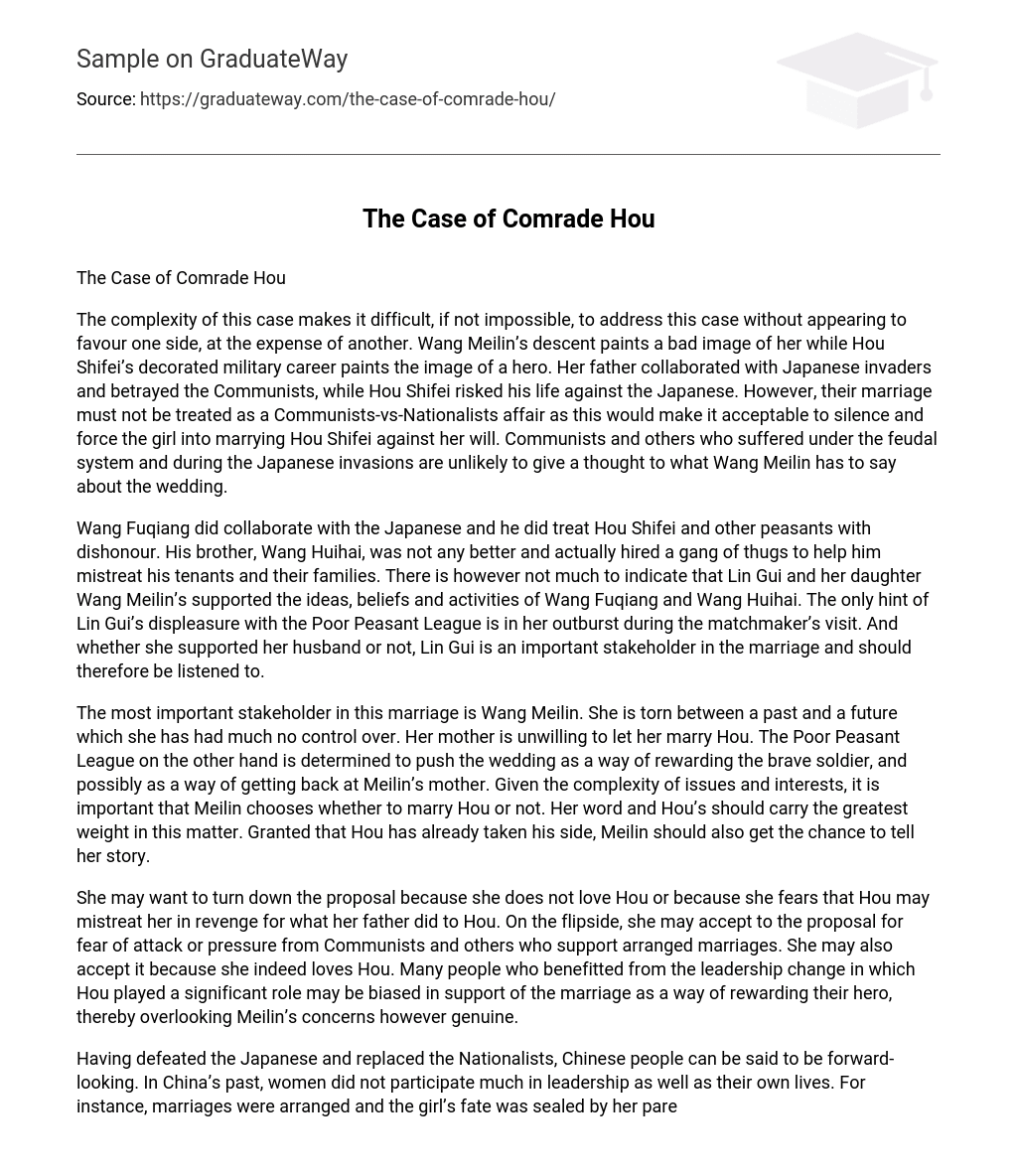The complexity of this case makes it difficult, if not impossible, to address this case without appearing to favour one side, at the expense of another. Wang Meilin’s descent paints a bad image of her while Hou Shifei’s decorated military career paints the image of a hero. Her father collaborated with Japanese invaders and betrayed the Communists, while Hou Shifei risked his life against the Japanese. However, their marriage must not be treated as a Communists-vs-Nationalists affair as this would make it acceptable to silence and force the girl into marrying Hou Shifei against her will. Communists and others who suffered under the feudal system and during the Japanese invasions are unlikely to give a thought to what Wang Meilin has to say about the wedding.
Wang Fuqiang did collaborate with the Japanese and he did treat Hou Shifei and other peasants with dishonour. His brother, Wang Huihai, was not any better and actually hired a gang of thugs to help him mistreat his tenants and their families. There is however not much to indicate that Lin Gui and her daughter Wang Meilin’s supported the ideas, beliefs and activities of Wang Fuqiang and Wang Huihai. The only hint of Lin Gui’s displeasure with the Poor Peasant League is in her outburst during the matchmaker’s visit. And whether she supported her husband or not, Lin Gui is an important stakeholder in the marriage and should therefore be listened to.
The most important stakeholder in this marriage is Wang Meilin. She is torn between a past and a future which she has had much no control over. Her mother is unwilling to let her marry Hou. The Poor Peasant League on the other hand is determined to push the wedding as a way of rewarding the brave soldier, and possibly as a way of getting back at Meilin’s mother. Given the complexity of issues and interests, it is important that Meilin chooses whether to marry Hou or not. Her word and Hou’s should carry the greatest weight in this matter. Granted that Hou has already taken his side, Meilin should also get the chance to tell her story.
She may want to turn down the proposal because she does not love Hou or because she fears that Hou may mistreat her in revenge for what her father did to Hou. On the flipside, she may accept to the proposal for fear of attack or pressure from Communists and others who support arranged marriages. She may also accept it because she indeed loves Hou. Many people who benefitted from the leadership change in which Hou played a significant role may be biased in support of the marriage as a way of rewarding their hero, thereby overlooking Meilin’s concerns however genuine.
Having defeated the Japanese and replaced the Nationalists, Chinese people can be said to be forward-looking. In China’s past, women did not participate much in leadership as well as their own lives. For instance, marriages were arranged and the girl’s fate was sealed by her parents who could either accept or turn down the match-maker’s request. The new and liberated China features such characters as Lu Bandao, a liberated woman and a possible representative of the future Chinese society. The Chinese cannot and should not remain stuck in a past where women have no say on issues which affect them directly. This strengthens the case for due attention to Meilin’s word on this marriage.
If Meilin turns down the proposal, the move might be interpreted as contravening the culture. However, the Chinese culture, like all other cultures, is dynamic and not static. Women could not accept marriage partners chosen by their partners simply because that was the culture. The acceptance of Lu Bandao points to a culture which is undergoing fundamental changes in matters pertaining to the role of women in society. While Hou has every right to marry Meilin, he should not treat her as a piece of property. The need to listen to men and to observe the culture must not lead to the exclusion of women in decision-making.





